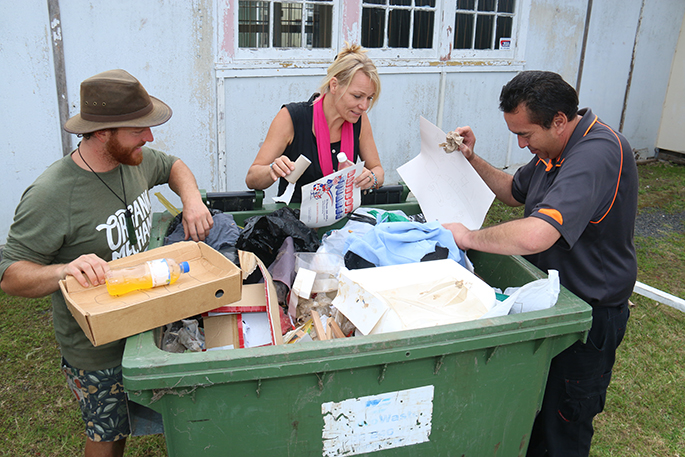Western Bay of Plenty residents are invited to ‘waste' their Sunday at Historic Village learning how to clean their own backyards – and ultimately that of the planet.
Sustainable Backyard Month's last event for 2017 is ‘Clean Up Your Backyard' today from 10am-2pm.
Envirohub's Sustainable Backyards regional event coordinator Diana Donker says it's a chance for people to learn how simple and small changes to the way they dispose of waste can be part of a huge step to creating a healthier planet.
'Normally we do an envirofest – but I've noticed there's still a lot of people around here who don't know how to recycle and what they can do to reduce waste going to landfill.”
'That's something that's really close to my heart because it affects everyone – we can all do a little bit to make the change. So I decided to go for a day that's completely about waste,” says Diana.
There's a line-up of activities and talks for young and old alike, starting with a mini clean-up challenge at 10.15am to show people how much litter is actually around.
'This is to show if we all do our bit we actually can make quite an effect [in minimizing waste].”
At 10.30am is a Great Waste Race, aimed at kids, led by Tauranga City Council waste educator Sue Matthews.
'Children receive a bucket-full of clean rubbish and have to sort this into recycling bins, a sink, a compost bin and a general waste bin as quickly as possible. The fastest child wins a prize.”
At 11am Te Maunga Recycling Plant manager Victor Howe will talk recycling. 'He's really passionate about recycling.
'So he'll tell us what can be recycled, what happens to it when we put in the recycling bin, where it goes from there and what is made from it – this will really showcase that recycling is worthwhile,” says Diana.
She thinks many don't bother recycling because they don't know where it ends up – or how it is re-used.
'Some people have got the feeling nothing happens to it – but in actual fact, something does. 'Wheelie bins are made out of plastic bottles, glass is very valuable for making products, milk bottles are also a really good product to recycle, so is cardboard.”
At 11.45am Leo Murray from Why Waste will talk about organic waste, worm farming and compost.
'People probably don't realise that 40 per cent of waste going into our rubbish bins – and into landfill – is organic waste that we can do something with.
'So Leo will talk about different ways of dealing with this organic waste,” says Diana.
At 12.30pm children can make a bird feeder from recycled material – and Diana herself will finish the event at 1.15pm by talking about ‘Zero Waste at Home'.
'Here I will talk about simple, practical ways of reducing waste at home.”
Diana says the main message is what we do with our waste affects us all – and it affects our health, and the health of our planet.
'Waste not only uses a lot of money, energy and natural resources to make the product but also it costs a lot to dispose of these products or its packaging once we've used them.
'So if we all do our small part in our everyday lives we can make a powerful difference to the health of everyone – not only ourselves but everything living on this planet.”
And changes don't need to be radical. 'If we all do one little thing it makes one huge step towards change. I think that is really important – plus it is also quite fun, easy to do and not expensive.
'Because people think being sustainable or green is expensive – but it's not. Ways to reduce or re-use waste are actually very cost-effective.”
It's all about going back to basics, says Diana. 'Basically, one generation has made a lot of rubbish [products] that we don't need – so it's about going back to the way our parents, and generations before them, used everything up.
'They looked at a product twice before they threw it away – if they could use it, re-use it or use part of it they would. Whereas today we think it's broken, throw it away and buy something new.
'It's going back to a simpler way of living that is not so harsh on the planet.”



1 comment
Main
Posted on 13-04-2017 09:49 | By Capt_Kaveman
Problem is Glass install bottle banks at supermarkets and bottle stores
Leave a Comment
You must be logged in to make a comment.